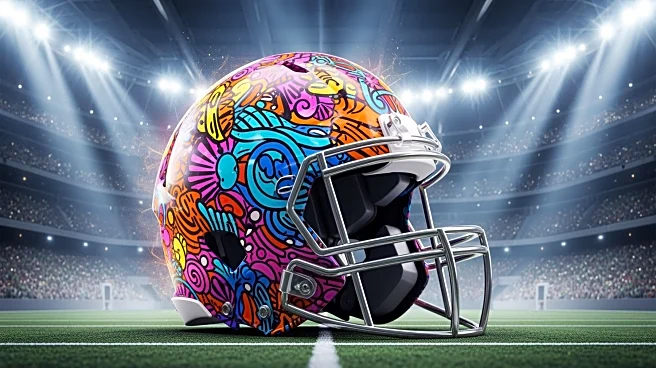What's Happening?
The National Football League (NFL) is set to host its first-ever game in Spain, featuring a halftime performance by Argentine producer Bizarrap and Puerto Rican superstar Daddy Yankee. The event will take place on November 16 at Madrid's Santiago Bernabéu
Stadium, where the Washington Commanders will face the Miami Dolphins. This marks Daddy Yankee's return to the stage after his retirement and his first live collaboration with Bizarrap, known for his viral 'BZRP Music Sessions.' The performance will debut a new collaboration titled 'BZRP Music Sessions, Vol. 0/66.' The NFL aims to expand its cultural and global footprint by spotlighting Latin artists at international games.
Why It's Important?
The inclusion of Latin music stars Bizarrap and Daddy Yankee in the NFL's first game in Spain highlights the league's strategy to broaden its appeal and cultural reach. By integrating popular Latin artists into its events, the NFL is tapping into the vibrant and diverse fan base of Latin music, potentially increasing its viewership and engagement in international markets. This move could enhance the NFL's brand recognition and cultural relevance, particularly in regions with strong Latin cultural ties. The event also underscores the growing influence of Latin music in global entertainment, showcasing its ability to draw large audiences and create memorable experiences.
What's Next?
The NFL's initiative to feature Latin artists at international games may lead to more collaborations and performances in future events, further integrating diverse cultural elements into its global strategy. As the league continues to expand its international presence, it may explore additional opportunities to engage with different cultural communities, potentially influencing its marketing and outreach efforts. The success of this event could encourage other sports leagues to adopt similar strategies, fostering a more inclusive and culturally rich sports entertainment landscape.
Beyond the Headlines
The NFL's decision to feature Latin artists in its international games reflects broader cultural shifts towards inclusivity and diversity in sports entertainment. This approach not only celebrates Latin music but also acknowledges the importance of cultural representation in global events. It may inspire other industries to embrace diverse cultural expressions, promoting cross-cultural understanding and collaboration. Additionally, the event could contribute to the ongoing dialogue about the role of sports in bridging cultural divides and fostering global unity.
















